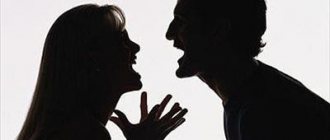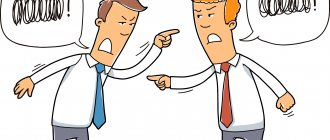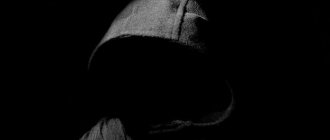Delinquency is an increasingly common phenomenon these days. It implies a violation of social norms accepted in society. The increasingly widespread nature of delinquent and deviant behavior has forced sociologists, psychologists, doctors, law enforcement officials and even ordinary people to pay attention to them. Many scientists are studying the causes, factors and conditions that determine the manifestation of this negative phenomenon. However, first you need to understand what normal behavior is and what causes it?
Characteristics of deviant behavior
In some modern studies, the concept of “deviant behavior” is often correlated with another type of behavior – delinquent. But in reality, these concepts, despite their consonance and some identity, still do not coincide.
Figure 1. Deviant behavior. Author24 - online exchange of student work
Deviant human behavior is a multifaceted concept. On the one hand, it is defined as a human act, an action that does not correspond to generally accepted and formal norms and standards in society. On the other hand, deviant behavior is a special social phenomenon that is expressed in mass forms of human behavior and activity. At the same time, these forms also do not correspond to the officially established norms and standards that have developed in a particular society.
Finished works on a similar topic
- Positive deviations from social norms, which are aimed at getting rid of outdated and irrelevant standards and norms. This contributes to a qualitative change in the social system, without which society cannot further develop and reach a completely new level of its development.
- Negative deviations from social norms - in other words, they are called dysfunctional, since they can disorganize the social system and lead it to inevitable destruction. This, in turn, becomes the cause of deviant behavior of members of society who are dissatisfied with the current circumstances and strive with all their strength and actions to demonstrate their dissatisfaction.
Figure 2. Forms of deviant behavior. Author24 - online exchange of student work
Too lazy to read?
Ask a question to the experts and get an answer within 15 minutes!
Deviant behavior can be of several types:
- Firstly, it is innovation, which involves agreement with the general goals of society, but at the same time the denial of generally accepted methods that could help achieve these goals;
- Secondly, ritualism is associated with the denial of the goals of a particular society and the absurd exaggeration of ways to achieve them;
- Thirdly, retreatism is the refusal of a person or group of people from socially approved goals and, accordingly, the rejection of traditional and customary ways of achieving them.
The last type of deviant behavior is rebellion. He denies both goals and methods of achieving goals, but at the same time strives to replace them with completely new ones. Rebels include revolutionaries who strive for a radical disruption of all social relations. At the same time, they can offer new ways to achieve goals, or they can simply destroy old ones without the possibility of alternatives.
Figure 3. Causes of deviant behavior. Author24 - online exchange of student work
Control mechanisms and strategies
The state can use certain mechanisms and strategies to change the situation and prevent its aggravation. There is a fundamental difference in the application of mechanisms and strategies.
Mechanisms are certain, specific methods of influence that are coercive or mandatory.
Mechanisms that society should apply to reduce the number of manifestations of delinquent behavior:
- strengthening the system of punishments for committed acts;
- exercising indirect control over individuals at risk through their introduction into groups of law-abiding individuals.
Strategies are general plans of action over a long period of time aimed at achieving a goal. Strategies to reduce the number of delinquents in society can be as follows:
- Raising the general cultural level of the nation . The higher the level of spiritual development of a person, the less likely it is that he will commit an antisocial act.
- Improving the quality of life of the population , as a result of which the level of material well-being of the nation will increase, and the need to commit illegal actions to obtain various benefits will decrease.
- Legalization of forms of behavior that are asocial, but do not entail legal consequences: vagrancy, prostitution, homosexuality.
The ability to act without cover will give representatives of these social groups and subcultures full rights in society. This will save them from the need to break the law in an effort to hide their inclinations and interests from society. - Development of a comprehensive support system: drug treatment, psychological, etc. Support should be aimed at facilitating socialization and adaptation in society for citizens with various problems.
Causes of delinquency
The delinquent type of deviant behavior occurs in both adults and adolescents. It is impossible to single out one reason for such social behavior; many factors influence its development, creating interconnected complexes.
The following reasons for antisocial behavior are identified.
Psychophysiological
personality type and character; anxiety level; physical diseases and characteristics; addictions (alcohol, drugs, gambling, etc.).
Family
divorce of parents, emergence of a partner for a single parent; the passing of a close relative; lack of education, bad example of parents; domestic mental and physical violence; parents' addictions, dysfunctional family.
Socio-economic
social inequality, division between rich and poor; unemployment, lack of funds; ethnic conflicts.
Valeria Belova
We suggest you read: Which doctor treats a kidney cyst?
Also, the cause of delinquency may be a forced change in the social environment (change of place of residence, social circle, loss of housing, etc.).
The essence of delinquent behavior
Delinquent behavior is also a social behavior of a person, which is manifested in his actions. This can be any action or inaction in relation to the current situation. Delinquent behavior can cause harm to an individual or to society as a whole.
Unlike deviant behavior, delinquent behavior is more of a misdemeanor than a conscious crime.
Figure 4. Delinquent behavior. Author24 - online exchange of student work
Adolescent delinquency is of great interest. At this age, a person most often commits various offenses, both intentional and unconscious. The increase in such offenses and the lack of prevention can lead to the fact that delinquent behavior will be perceived by a person as the norm.
More often, delinquent behavior is presented in the form of causing harm. This is due to the encroachment of dilinquent on a person, his rights and freedoms. This also includes property that he can ruin, following any of his own motives. Various types of delinquent behavior, despite their relative innocence in comparison with deviant behavior, are still condemned by society.
They are formalized by the state in legal norms by describing the features that characterize them and defining them as offenses. For delinquent acts, the law establishes a variety of types of social or criminal responsibility (which rarely goes beyond administrative responsibility and community service).
https://www.youtube.com/watch?v=ytpressru
There are several types of delinquent behavior:
- Firstly, delinquent behavior includes administrative offenses - violation of traffic rules, petty hooliganism. Smoking or drinking alcohol in public places is also considered an administrative offense.
- Secondly, a disciplinary offense is delinquent - an unlawful, guilty and deliberate failure to fulfill one’s labor duties. Such delinquent offenses entail disciplinary liability, which is provided for in labor legislation.
Such offenses include: absenteeism for an unexcused reason, showing up at work in poor condition, under the influence of drugs or toxic substances, and violating labor safety rules.
If delinquent behavior is not corrected in time, then a rather negative picture will emerge: a person who perceives his behavior as the norm will continue to commit crimes, only more serious ones. The normality of such
Still haven't found the answer to your question?
Just write what you need help with
History of the study
Normal human behavior is the basis for the harmonious functioning of any society. Therefore, at all times, authorities, philosophers and scientists have sought to find methods and means of stimulating it. Therefore, delinquency is a subject of sociological research. The origins of its study go back to Durkheim. However, a separate direction devoted to the study of delinquency was formed thanks to Merton and Cohen. In the USSR it was studied within the framework of narcology, criminology and suicidology as special disciplines. Delinquency has been a subject of study by Russian sociologists only since the 1960s and 1970s. Afanasiev, Zdravomyslov, Matochkin, and Gilinsky made a great contribution to the study of this phenomenon.
Features of delinquent behavior in adolescents
In adolescence, the basic causes of delinquency are aggravated by the age crisis, the gap between needs and the impossibility of satisfying them due to accepted norms in society. Features of the psychology of an antisocial teenager:
- The group nature of social relations. Illegal acts committed in a group give a feeling of anonymity and impunity.
- Denial of the authority of parents and adults. The teenager strives for independence, independence, but at the same time he has an underdeveloped sense of responsibility and self-control. Such qualities make a person vulnerable to harmful influences from the outside, so in adolescence there is a high risk of becoming addicted to drugs, alcohol, tobacco, etc.
- Aggression, increased excitability, nervousness, frequent mood swings, lack of interest in life, depression.
- Willingness to take risks without realizing the consequences.
- Incorrect portrayal of the image of an adult. Trying to appear courageous, a young man can be rude; Wanting to appear feminine, a girl can be vulgar.
Valeria Belova
Behavior that deviates from social and legal norms should be a signal that the growing child needs more time and attention from his parents. You will also need the supervision of specialist psychologists and teachers to avoid the consolidation of an antisocial lifestyle.
The concept of a delinquent
A delinquent is a person whose actions are antisocial and illegal.
The actions of this subject involve a violation of legal norms.
Inappropriate behavior of a delinquent leads to legal consequences for him.
A delinquent may be an adult or a teenager .
Specialists pay special attention to the problem of deviant behavior in adolescents, since these representatives of society, due to the age-related characteristics of their psyche, are at risk.
Timely assistance from parents, teachers, and representatives of public organizations can prevent the further development of a child’s criminal personality.
Examples of delinquent behavior
Signs of actions that contradict accepted norms are that people commit them deliberately, for show, wanting to attract the attention of as much of the public as possible. At the same time, violators are well aware of their actions.
Examples of such actions could be:
- creativity that destabilizes public peace (“yellow” journalism, creation of fake news, inappropriate images, “memes”, creation and development of porn sites and other prohibited content);
- cybercrime - “hacking”;
- addiction;
- disciplinary and administrative offenses;
- animal abuse;
- running away from home, begging;
- prostitution;
- vandalism;
- auto-aggression - aggression directed at oneself, rejection of one’s body, suicide;
- participation in the preparation and execution of terrorist attacks.
With the development of the Internet and social networks, young people are becoming involved in many activities aimed at destabilizing public peace, therefore, diagnosis and prevention of antisocial behavior should begin before children enter adolescence.
Signs of delinquent behavior
Symptoms of such abnormalities can often be observed in adolescents. Delinquent behavior is actions that lead to actions that harm other people. The child’s character and temperament play an important role in the development of such deviations. Adventurers, choleric people, aggressors often become delinquents. Based on the characteristics of the behavior of adolescents prone to delinquent behavior, they are divided into several groups:
- Children who have a minimal understanding of social norms and are easily influenced by others. Adolescent delinquency develops quickly in such children.
- Teenagers who lack an inner core, have little ability to differentiate what is good and bad, and can easily follow their needs.
- Children leading an immoral lifestyle consciously and easily exceed acceptable standards of behavior.
External and internal factors
In a more extensive analysis of the conditions that cause the formation of delinquent behavior, it is customary to distinguish two groups: internal and external.
External conditions:
- problems in the family , which are the main reasons for the formation of antisocial behavior in a person at an early age;
- underdevelopment of the system of public education of the individual : lack of an individual approach, lack of interest in each individual person on the part of the state;
- the averageness of the education system , which is not designed to take into account the characteristics of the emotional, psychological, and intellectual development of children.
Internal conditions:
- Physiological characteristics of the individual (mental development disorders, hearing defects, visual defects, physical characteristics, etc.). Often people with developmental disabilities or with pronounced defects in appearance experience great difficulties in socializing in society. Self-doubt, helplessness, dependence on others and frequent encounters with misunderstanding from society can give rise to aggression and a desire for antisocial behavior in a person. Society must pay special attention to people with special needs and prevent their isolation.
- Psychological problems (neuropsychic diseases, psychopathy, neurasthenia, etc.). These mental characteristics make people excitable and prone to committing illegal acts. Such people should be registered with medical institutions and be supervised, since during the period of exacerbation of their illnesses they are prone to committing serious crimes.
- Features of adolescence. Teenagers are more susceptible to delinquent behavior due to mental characteristics at this age. They often show increased aggressiveness, reluctance to follow the norms of society, and reluctance to give in to the requests of parents and teachers.
Teenagers often exhibit a need for risk, prestige, approval, a desire to impress and challenge society. Such desires often lead to the commission of illegal actions that are demonstrative in nature.Antisocial behavior can go away on its own over time as a result of natural age-related changes, or it can lead to the formation of an antisocial type of adult personality.











